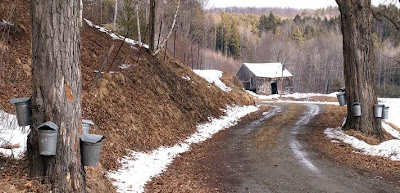 0
0I’m sure many of you already know Charles Dudley Warner – especially those of you who live in New England. But I “discovered” him yesterday when I found “How Spring Came in New England”.
It’s a charming little book – perhaps should I call it a booklet as it is very short. I’ll give you the first – and last paragraphs:
New England is the battle-ground of the seasons. It is La Vendee. To conquer it is only to begin the fight. When it is completely subdued, what kind of weather have you? None whatever.
What is this New England? A country? No: a camp. It is alternately invaded by the hyperborean legions and by the wilting sirens of the tropics. Icicles hang always on its northern heights; its seacoasts are fringed with mosquitoes. There is for a third of the year a contest between the icy air of the pole and the warm wind of the gulf. The result of this is a compromise: the compromise is called Thaw. It is the normal condition in New England. The New-Englander is a person who is always just about to be warm and comfortable. This is the stuff of which heroes and martyrs are made. A person thoroughly heated or frozen is good for nothing. Look at the Bongos. Examine (on the map) the Dog-Rib nation. The New-Englander, by incessant activity, hopes to get warm. Edwards made his theology. Thank God, New England is not in Paris!
_ _ _
Paragraphs appear in the newspapers, copied from the paper of last year, saying that this is the most severe spring in thirty years. Every one, in fact, believes that it is, and also that next year the spring will be early. Man is the most gullible of creatures.
And with reason: he trusts his eyes, and not his instinct. During this most sour weather of the year, the anemone blossoms; and, almost immediately after, the fairy pencil, the spring beauty, the dog-tooth violet, and the true violet. In clouds and fog, and rain and snow, and all discouragement, Nature pushes on her forces with progressive haste and rapidity. Before one is aware, all the lawns and meadows are deeply green, the trees are opening their tender leaves. In a burst of sunshine the cherry-trees are white, the Judas-tree is pink, the hawthorns give a sweet smell. The air is full of sweetness; the world, of color.
In the midst of a chilling northeast storm the ground is strewed with the white-and-pink blossoms from the apple-trees. The next day the mercury stands at eighty degrees. Summer has come.
There was no Spring.
The winter is over. You think so? Robespierre thought the Revolution was over in the beginning of his last Thermidor. He lost his head after that.
When the first buds are set, and the corn is up, and the cucumbers have four leaves, a malicious frost steals down from the north and kills them in a night.
That is the last effort of spring. The mercury then mounts to ninety degrees. The season has been long, but, on the whole, successful. Many people survive it.
I’m still using a borrowed computer and have no access to my own pictures so I borrowed the above photo from http://www.visitnh.gov/.


I'm afraid that I hadn't heard of Charles Dudley Warner, Margaretha, so thank you for the introduction. I like his style and will see if the library has any of his books, although I suspect they are more likely to be in the antiquarian bookshops.
SvaraRaderaMaureen
Maureen,
SvaraRaderaGutenberg has quite a few of his books – but I have to admit that reading from a book is nicer than from a screen.
Our small library is very helpful when it comes to borrowing books from other libraries. But I guess many libraries are cutting down on that kind of costly service.
Margaretha
I like Charles Dudley Warner's book "My summer in a garden". It's a thin, little booklet too, but wonderfully written. Nineteen weeks are described, the joys and also some frustration of a gardener.
SvaraRaderaBy the way, Vira is the next village to San Nazzaro where I made the pictures of the camelias :-) !!
Have a good time and enjoy Spring!
Barbara
Barbara,
SvaraRaderaI took a quick look at My Summer in a Garden yesterday, as it is available at Gutenberg. I probably will return to it – perfect to read at the veranda!
I can imagine that those small villages have changed since I was there – I think it was the summer of -61.
Have a grand spring!
Margaretha